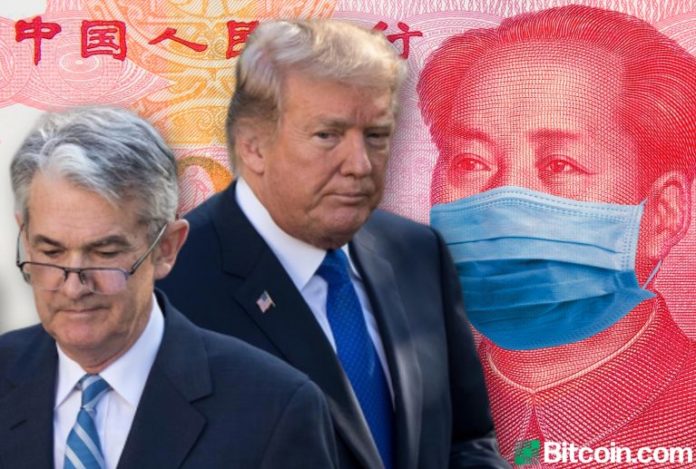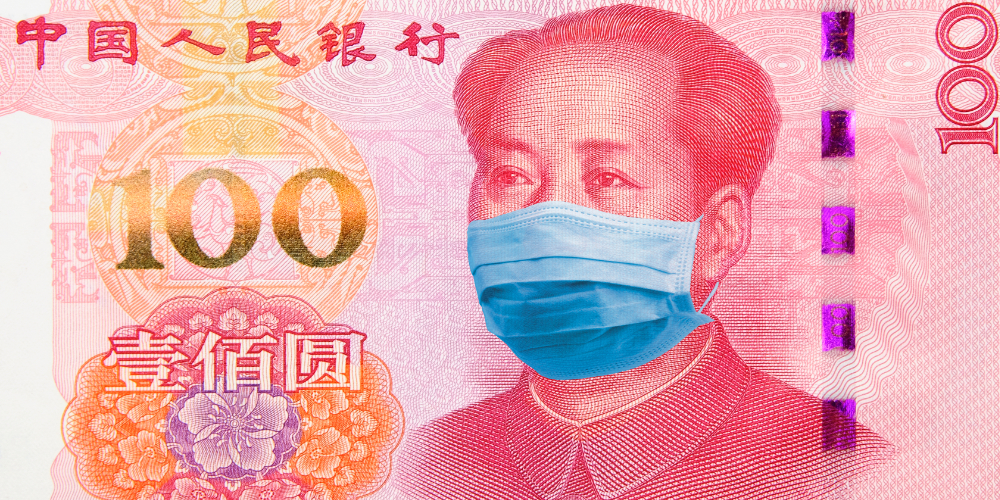
In this roundup, we cover numerous cryptocurrency regulatory developments in the U.S., including President Trump’s crypto proposals, testimonies by the Federal Reserve chairman and the Treasury secretary, a crypto-friendly SEC proposal, and the IRS changing a crypto tax rule. We also cover China quarantining yuan bills, its central bank filing 84 digital currency patents, 40 German banks wanting to offer crypto services, several blockchain initiatives by the Indian government and more.
Also read: Regulatory Roundup – New US Crypto Tax Bill, Central Banks Join Forces on Digital Currencies
Trump’s Budget, Fed Chair’s Testimony, SEC Proposal
It has been a busy week for the U.S. government trying to regulate the crypto space. Perceiving cryptocurrency as a threat, President Donald Trump proposed a few measures to increase oversight of the industry in his new budget. He wants to return the Secret Service to the Treasury “to create new efficiencies in the investigation” of crimes, including those involving cryptocurrencies. He also proposed a budget of $127 million for the Financial Crimes Enforcement Network (FinCEN) “to combat emerging virtual currency and cybercrime threats.”
Also last week, Federal Reserve Chairman Jerome Powell testified before the House of Representatives Committee on Financial Services and Treasury Secretary Steven Mnuchin testified before the Senate Finance Committee. After answering questions about a digital dollar, Powell said “The idea of having a ledger where you know everybody’s payments is not something that would be, you know, particularly attractive in the United States context. It’s not a problem for China.” Mnuchin revealed that the Treasury will soon release new crypto regulations to increase transparency. Independently, the president of the Federal Reserve Bank of Minneapolis, Neel Kashkari, called bitcoin and other cryptocurrencies “a giant garbage dumpster.”

While the Department of Justice (DOJ) is criminalizing onchain privacy starting with mixers, the U.S. Office of the Director of National Intelligence is seeking researchers to determine how cryptocurrency could undermine the dollar as the world’s reserve currency. The director is the head of the Intelligence Community comprising 17 agencies, including the Federal Bureau of Investigation (FBI), the Central Intelligence Agency (CIA), the Department of Homeland Security (DHS), and the National Security Agency (NSA). In addition, the U.S. is auctioning over 4,040 seized bitcoins, currently worth approximately $40 million.
In the financial sector, token projects may see a sign of relief from the U.S. Securities and Exchange Commission (SEC) as crypto-friendly Commissioner Hester Peirce has unveiled her “Token Safe Harbor Proposal.” It is designed to give token projects a three-year grace period before deciding whether they involve the offering of a security. Meanwhile, the pro-crypto presidential candidate Andrew Yang has dropped out of the race to become the president of the United States.
IRS Backtracks on In-Game Tokens
Soon after the U.S. Internal Revenue Service (IRS) started accepting tax filings this year, it modified the text of a page on its website which details the tax treatment of cryptocurrency. The agency announced on Feb. 14: “The IRS recognizes that the language on our page potentially caused concern for some taxpayers. We have changed the language in order to lessen any confusion.”

The topic of confusion is in-game currencies. Previously, the IRS listed “bitcoin, ether, Roblox, and v-bucks” as examples of a convertible virtual currency. However, it quietly removed everything except bitcoin last week. The tax authority clarified:
Transacting in virtual currencies as part of a game that do not leave the game environment (virtual currencies that are not convertible) would not require a taxpayer to indicate this on their tax return.
China Quarantines Banknotes
China is currently combating the coronavirus which has killed more than 1,500 people and infected more than 66,000 people in the country. The government is now scrubbing and quarantining banknotes to stop the spread of the deadly virus by touching the bills. The central bank, the People’s Bank of China (PBOC), explained that banks use ultraviolet light or high temperatures to disinfect yuan bills. They are then sealed and stored for seven to 14 days, depending on the severity of the outbreak in a particular area, before being recirculated.
As for the impending launch of a central bank digital currency, the PBOC has reportedly filed 84 patents relating to its digital yuan. “Virtually all of these patent applications relate to integrating a system of digital currency into the existing banking infrastructure,” patent attorney Marc Kaufman commented.

German Banks Declare Intent to Offer Crypto services
More than 40 financial institutions in Germany have reportedly declared to the Federal Financial Supervisory Authority (BaFin) that they are interested in offering cryptocurrency custody services under the new German law. The law implementing the amendment to the Fourth EU Money Laundering Directive entered into force on Jan. 1.
The regulator told news.Bitcoin.com that financial services companies as of that date must submit their intent to apply for a license by March 31 and complete a license application by Nov. 30. The length of time it takes for an applicant to be granted a license depends on the individual case.
Furthermore, German banks are still struggling to cope with the negative interest rate policy maintained by the European Central Bank (ECB). At least 41 banks in the country are now charging their customers negative interest rates and the number is rising.
Australia Has 312 Registered Crypto Exchanges
The Australian Transaction Reports and Analysis Centre (AUSTRAC), the country’s financial intelligence agency and anti-money laundering regulator, has confirmed to news.Bitcoin.com that it has registered and enrolled 312 digital currency exchange providers.
“Since April 2018, AUSTRAC has regulated digital currency exchange providers to minimize the risk of criminals using them for money laundering, terrorism financing and cybercrime,” a spokesperson for the regulator said.

Indian Government Dives Deep Into Blockchain While All Await Supreme Court Verdict on RBI Ban
The government of India has been ramping up its efforts to integrate blockchain technology into its existing infrastructures. Last week, the country’s Chief Election Commissioner revealed that the Election Commission is working on a blockchain system for voting.
Earlier this month, the government’s premier policy think tank, Niti Aayog, released a report identifying key blockchain use cases in India. It followed a report entitled National Strategy on Blockchain, compiled by the National Institute for Smart Government as directed by the Ministry of Electronics and Information Technology (MeitY). It calls for the central bank, the Reserve Bank of India (RBI), to issue a digital rupee. Moreover, the Telangana state government has launched a blockchain accelerator in partnership with Tech Mahindra and IBC Media.
While the Indian government has not made a decision on whether to regulate or ban cryptocurrencies in the country, Prime Minister Narendra Modi recently awarded a young entrepreneur for her work on a cryptocurrency app. Additionally, the supreme court has yet to announce its verdict on whether to lift the banking restriction imposed on crypto businesses by the RBI. The court wrapped up hearing the arguments against the ban several weeks ago and has reserved judgment on the case.
Switzerland to Lower User-Verification Threshold
The Swiss Financial Market Supervisory Authority (FINMA) has published a proposal for a follow-up crypto regulation. It proposed amending the client identification threshold values in its Anti-Money Laundering Ordinance from CHF 5,000 ($5,092) to CHF 1,000 for crypto exchange transactions. FINMA says it’s “acknowledging the heightened money-laundering risks in this area.” The regulator is holding a consultation on this follow-up regulation until April 9.
What do you think of the crypto regulatory developments covered in this roundup? Let us know in the comments section below.
Disclaimer: This article is for informational purposes only. It is not an offer or solicitation of an offer to buy or sell, or a recommendation, endorsement, or sponsorship of any products, services, or companies. Bitcoin.com does not provide investment, tax, legal, or accounting advice. Neither the company nor the author is responsible, directly or indirectly, for any damage or loss caused or alleged to be caused by or in connection with the use of or reliance on any content, goods or services mentioned in this article.
Images courtesy of Shutterstock and the Financial Times.
Did you know you can buy and sell BCH privately using our noncustodial, peer-to-peer Local Bitcoin Cash trading platform? The local.Bitcoin.com marketplace has thousands of participants from all around the world trading BCH right now. And if you need a bitcoin wallet to securely store your coins, you can download one from us here.
The post Regulatory Roundup: Trump’s Cryptocurrency Proposals, IRS Changes Rule, China Quarantines Cash appeared first on Bitcoin News.

Bitcoin.com is author of this content, TheBitcoinNews.com is is not responsible for the content of external sites.
Our Social Networks: Facebook Instagram Pinterest Reddit Telegram Twitter Youtube











